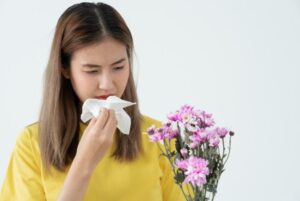Conquering Seasonal Allergies: A Guide to Relief

Battling the Buzz: Understanding Seasonal Allergies
Do you find yourself constantly sniffling and sneezing when the seasons change? You might be grappling with seasonal allergies, those pesky companions that can turn a sunny day into a struggle. From itchy eyes to relentless sniffles, these allergies can truly put a damper on your daily routine. But fear not! Understanding how to manage these symptoms effectively is crucial for reclaiming control over your life. In this guide, we’ll walk you through everything you need to know to conquer seasonal allergies and find the relief you deserve. Let’s banish those sniffles and embrace the great outdoors once again!
Unraveling the Mystery of Seasonal Allergies
Have you ever found yourself reaching for tissues every time spring rolls around? You’re not alone. Seasonal allergies, also known as hay fever or allergic rhinitis, are a common affliction that affects millions of people worldwide. But what exactly are seasonal allergies, and why do they make us feel so miserable?
Defining Seasonal Allergies and Their Triggers

Seasonal allergies occur when the immune system reacts to allergens present in the environment, triggering a range of symptoms. These allergens commonly include pollen from trees, grasses, and weeds, as well as mold spores. When individuals with allergies come into contact with these triggers, their immune system mistakenly identifies them as harmful invaders, leading to an inflammatory response.
Understanding Typical Symptoms
The symptoms of seasonal allergies can vary from person to person, but some common ones include sneezing, itchy or watery eyes, nasal congestion, and fatigue. These symptoms can range from mildly annoying to severely debilitating, affecting daily activities and overall quality of life.
The Seasonal Dance of Allergies
One of the defining characteristics of seasonal allergies is their seasonal nature. Depending on geographic location and the time of year, different allergens may be more prevalent, leading to varying patterns of symptoms. For example, tree pollen allergies often peak in the spring, while grass pollen allergies tend to flare up in the late spring and early summer. The prevalence of mold allergies may increase in humid environments or during the fall months.

Understanding these seasonal patterns is crucial for effectively managing seasonal allergies throughout the year. By knowing when and where certain allergens are most prevalent, individuals can take proactive steps to minimize exposure and alleviate symptoms.
So next time you find yourself battling the sniffles and sneezes, remember that seasonal allergies are just a natural part of the seasonal cycle. Armed with knowledge and a few handy tips, you can conquer seasonal allergies and enjoy the great outdoors without fear of pollen-induced misery.
Exploring OTC Medications for Seasonal Allergies
When it comes to managing the bothersome symptoms of seasonal allergies, over-the-counter (OTC) medications can be a game-changer. These readily available remedies come in various forms, each targeting specific symptoms to provide much-needed relief.
Types of OTC Medications
- Antihistamines: Antihistamines work by blocking the action of histamine, a chemical released by the body in response to allergens. This helps alleviate symptoms like sneezing, itching, and runny nose.
- Decongestants: Decongestants work by narrowing blood vessels in the nasal passages, reducing swelling and congestion. They can provide relief from stuffy noses and sinus pressure.
- Nasal Sprays: Nasal sprays contain medications like corticosteroids or antihistamines that can reduce inflammation and relieve nasal congestion and irritation.
How They Work
- Antihistamines: By blocking histamine receptors, antihistamines help alleviate symptoms such as sneezing, itching, and runny nose.
- Decongestants: Decongestants shrink swollen nasal tissues, allowing for easier breathing and relieving congestion.
- Nasal Sprays: These sprays reduce inflammation in the nasal passages, providing relief from congestion and discomfort.
Choosing the Right Medication
Selecting the most suitable OTC medication depends on individual symptoms and preferences. Those experiencing primarily nasal congestion may benefit from decongestants or nasal sprays, while those with more generalized symptoms like sneezing and itching may find relief with antihistamines. It’s essential to read labels carefully and consider any existing health conditions or medication interactions.
Importance of Proper Usage
Regardless of the type of OTC medication chosen, it’s crucial to follow dosage instructions carefully. Taking more than the recommended dose can lead to adverse effects or interactions with other medications. If symptoms persist or worsen despite OTC treatment, consulting a healthcare professional is advisable to explore other treatment options or rule out underlying conditions.
Boosting Immunity with Vitamins
Did you know that certain vitamins and minerals can play a vital role in supporting your immune system and combating seasonal allergies? It’s true! By harnessing the power of these nutrients, you can potentially reduce allergy symptoms and enhance your overall well-being.
Key Vitamins and Supplements
- Vitamin C: This powerhouse nutrient is known for its antioxidant properties and its ability to modulate immune responses. Studies suggest that vitamin C may help reduce allergy symptoms by inhibiting the release of histamine, the chemical responsible for allergic reactions.
- Vitamin D: Often referred to as the “sunshine vitamin,” vitamin D plays a crucial role in immune function. Research indicates that vitamin D deficiency may be linked to an increased risk of allergies and asthma. Supplementing with vitamin D or increasing sun exposure may help alleviate symptoms for some individuals.
- Quercetin: Quercetin is a flavonoid found in many fruits, vegetables, and herbs. It exhibits anti-inflammatory and antihistamine properties, making it a popular choice for allergy relief. Quercetin supplements may help reduce allergic reactions by stabilizing mast cells and inhibiting the release of histamine. Foods such as apples for example.
Incorporating Vitamins into Your Diet
While supplementation can be beneficial, it’s essential to prioritize a balanced diet rich in vitamins and minerals. Incorporating vitamin C-rich foods like citrus fruits, bell peppers, and strawberries, as well as vitamin D sources like fatty fish and fortified dairy products, can help support your immune system naturally. Additionally, including quercetin-rich foods such as onions, apples, and leafy greens in your diet may provide added allergy protection.
Consultation with Healthcare Providers
Before starting any new supplement regimen, it’s crucial to consult with a healthcare provider, especially if you have underlying health conditions or are taking medications. They can offer personalized recommendations based on your individual needs and ensure that supplements are safe and effective for you.
Embracing Aromatherapy for Seasonal Allergies
Looking for a natural approach to alleviate allergy symptoms? Enter aromatherapy, a practice that harnesses the power of essential oils to promote relief and relaxation. These aromatic extracts from plants have been used for centuries for their therapeutic benefits, including combating inflammation, easing congestion, and boosting the immune system.
Key Essential Oils for Allergy Relief
- Peppermint:
 With its invigorating scent, peppermint oil is renowned for its anti-inflammatory and decongestant properties. Inhaling peppermint oil can help open up the airways and relieve nasal congestion, making it a go-to choice for allergy sufferers.
With its invigorating scent, peppermint oil is renowned for its anti-inflammatory and decongestant properties. Inhaling peppermint oil can help open up the airways and relieve nasal congestion, making it a go-to choice for allergy sufferers.
- Eucalyptus: Eucalyptus oil is prized for its ability to clear the sinuses and
 soothe respiratory discomfort. Its refreshing aroma can provide relief from congestion and promote easier breathing, making it a staple in many allergy relief blends.
soothe respiratory discomfort. Its refreshing aroma can provide relief from congestion and promote easier breathing, making it a staple in many allergy relief blends. - Lavender: Known for its calming and immune-boosting effects, lavender oil can help reduce inflammation and alleviate allergy symptoms. Its gentle aroma promotes relaxation and can help ease the stress often
 associated with seasonal allergies.
associated with seasonal allergies.
Safe Usage Methods
When using essential oils for allergy relief, it’s essential to do so safely:
- Diffusing: Add a few drops of your chosen essential oil to a diffuser filled with water and allow the aroma to fill the room.
- Inhalation: Place a drop of diluted essential oil on a tissue or cotton ball and inhale deeply.
- Topical Application: Dilute essential oils with a carrier oil like coconut or almond oil before applying them to the skin. Perform a patch test first to check for any adverse reactions.
Conclusion:
- Precautions and Consultation
While essential oils can offer natural relief, it’s crucial to exercise caution, especially if you have allergies or sensitivities. Always perform a patch test before using a new essential oil and consult with a healthcare professional, particularly if you’re pregnant, nursing, or taking medications.
- Finding Relief from Seasonal Allergies
As we wrap up our exploration of seasonal allergies, it’s crucial to remember the key points for managing these pesky symptoms effectively. By combining various strategies, you can take control of your allergies and reclaim your comfort and enjoyment of life.
- Personalized Approach for Relief
Consider incorporating a combination of over-the-counter medications, vitamins, and essential oils into your allergy management routine. Experiment with different remedies to find what works best for you and provides the most relief from your symptoms.
- Seek Professional Guidance
While self-care methods can be helpful, consulting with a healthcare provider is essential for personalized advice and guidance. Your doctor can offer recommendations tailored to your specific needs, taking into account any underlying health conditions or medication interactions.
- Embracing Hope for the Future
Remember, relief from seasonal allergies is within reach. With the right strategies and support, you can minimize the impact of allergies on your daily life and enjoy the changing seasons without the burden of symptoms. Stay proactive, stay informed, and don’t hesitate to reach out for assistance when needed.
